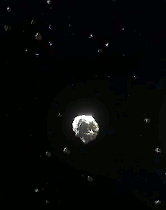(update firing solution notes) |
(moved lidar highlighting) |
||
| Line 9: | Line 9: | ||
<blockquote>The MLF is a basic autopilot module capable of preserving velocity and orientation of the craft, using simple heuristics to determine RCS fire. The widely available open-source Antipodal Reaction Limiter module is used to cancel out opposing inputs. This autopilot is not capable of adjusting to changes in mass or thrust configuration. | <blockquote>The MLF is a basic autopilot module capable of preserving velocity and orientation of the craft, using simple heuristics to determine RCS fire. The widely available open-source Antipodal Reaction Limiter module is used to cancel out opposing inputs. This autopilot is not capable of adjusting to changes in mass or thrust configuration. | ||
-In-game Description</blockquote> | -In-game Description</blockquote>[[File:LIDAR-highlight.gif|alt=A ringroid being destroyed, emitting ore chunks being highlighted with a green rectangle|thumb|MLF highlighting ore chucks]]The default autopilot system when starting a new game. The MLF is a simple, cheap autopilot with few features and is generally inefficient in most situations. | ||
[[File:LIDAR-highlight.gif|alt=A ringroid being destroyed, emitting ore chunks being highlighted with a green rectangle|thumb|MLF highlighting ore chucks]] | |||
==== LIDAR Highlighting ==== | ==== LIDAR Highlighting ==== | ||
The MLF will automatically highlight floating ore chunks with a rectangular box, allowing for easy identification of collectable ore. | The MLF will automatically highlight floating ore chunks with a rectangular box, allowing for easy identification of collectable ore. | ||
== MA-337 Autopilot == | == MA-337 Autopilot == | ||
<blockquote>The proprietary autopilot module of Mitsudaya-Starbus, the MA-337 can be retrofitted to most modern craft. It uses advanced heuristics combined with a pre-trained Adaptive Angular Thrust neural network to adapt to mid-flight changes to ship configuration, mass shifts, and thruster damage. | <blockquote>The proprietary autopilot module of Mitsudaya-Starbus, the MA-337 can be retrofitted to most modern craft. It uses advanced heuristics combined with a pre-trained Adaptive Angular Thrust neural network to adapt to mid-flight changes to ship configuration, mass shifts, and thruster damage. | ||
Revision as of 19:11, 5 December 2024
Autopilot Features
| Name | ARL | AAT | RTC | FBW | Capabilities | Price |
|---|---|---|---|---|---|---|
| MLF Autopilot | ☑ | LIDAR highlight | 10,000 E$ | |||
| MA-337 Autopilot | ☑ | ☑ | LIDAR overlay | 27,000 E$ | ||
| NDCI Autopilot | ☑ | ☑ | Firing solutions, Collision warnings | 60,000 E$ | ||
| ER-42 Autopilot | ☑ | ☑ | ☑ | ☑ | Trajectory prediction | 100,000 E$ |
| EIAA-1337 Autopilot | ☑ | ☑ | ☑ | ☑ | Autonomic | 150,000 E$ |
MLF Autopilot
The MLF is a basic autopilot module capable of preserving velocity and orientation of the craft, using simple heuristics to determine RCS fire. The widely available open-source Antipodal Reaction Limiter module is used to cancel out opposing inputs. This autopilot is not capable of adjusting to changes in mass or thrust configuration. -In-game Description
The default autopilot system when starting a new game. The MLF is a simple, cheap autopilot with few features and is generally inefficient in most situations.
LIDAR Highlighting
The MLF will automatically highlight floating ore chunks with a rectangular box, allowing for easy identification of collectable ore.
MA-337 Autopilot
The proprietary autopilot module of Mitsudaya-Starbus, the MA-337 can be retrofitted to most modern craft. It uses advanced heuristics combined with a pre-trained Adaptive Angular Thrust neural network to adapt to mid-flight changes to ship configuration, mass shifts, and thruster damage. -In-game Description
A balanced autopilot that is useful in many situations. The MA-337 considers the weight and shifting mass of chunks in the cargo hold when making maneuvers, granting it greater efficiency when piloting vessels that experience large shifts in mass over the course of a dive.
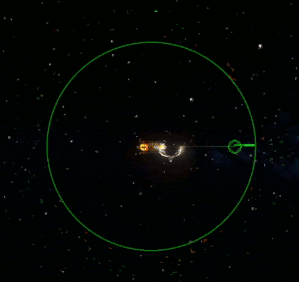
LIDAR Overlay
An overlay of the LIDAR system is displayed outside of the autopilot "bubble", allowing for quick reference to the LIDAR and is helpful in identifying nearby objects while maintaining focus on piloting the vessel.
NDCI Autopilot
The NDCI autopilot is a decommissioned and gentled military-grade artificial neural network, used as the autopilot system in Tsukuyomi-class frigates. Rotational Thrust Computation capabilities allow it to accurately process and predict the impact of thrust alignment on rotation, for faster heading adjustments and less unintentional rotation. Its integration with standard heads-up Display systems exposes its internal tactical assessment to the pilot. An integrated Fly-By-Wire system can interpret and augment direct thruster commands. The demilitarized system is not capable of full autonomy. -In-game Description
A combat-oriented autopilot, enabling precise aiming and superior collision avoidance, at the cost of high propellent consumption. The NDCI is suitable for bounty hunting, piracy, or other high-risk professions.
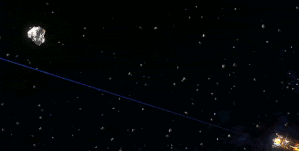
Firing solutions
Each weapon's (railgun, laser, microwave, etc.) firing arc is displayed, displaying it's trajectory and spread, as well as highlighting where an object is in the arc. Firing solutions also follow the aim of gimbled, turreted and misaligned weapons, allowing for precise aim even when damaged. Targeting solutions also let you know if anything unwanted is targeted, allowing you to adjust before firing upon the wrong object.
Collision warnings
When traveling at a speed where impacting an object would cause damage to the ship, lines from the ship to the object are displayed. Collision warnings shift from orange to red based on the time till impact, and display where the object would hit the ship in the event of an impact. The audible alert for collisions can be adjusted in the tuning menu, ranging from 0-10s (3s default), with 0s disabling the sound.
ER-42 Autopilot
This custom-built autopilot was designed specifically for ring racing events. It offers superior trajectory prediction and has an unparalleled suite of capabilities, but requires fully operational high-resolution sensors to work reliably. -In-game Description
This autopilot system needs to be unlocked from an event out in the ring before it can be installed on the ship. The ER-42 includes the full suite of autopilot features, and is well suited for performance craft and high-speed flight.
Trajectory prediction
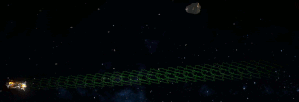
When moving at speed, an outline of the ship is displayed in the direction of travel, showing the ship's predicted position ahead of time. This prediction automatically updates as the ship changes in velocity and rotation.
EIAA-1337 Autopilot
This MIT-licensed autopilot module for the Model E was released stand-alone to "accelerate the advent of interstellar travel". Its retrofit costs include the complete required sensor package. While still in the early stages of testing, the Elon Interstellar Autonomous Autopilot is a sophisticated and adaptable autopilot assist system, even in crowded spaces or enclosed docking structures, at speeds up to 50m/s. Elon Interstellar is not responsible for any damage, injury, or death incurred due to operating the system outside its specified operating parameters.
THE SOFTWARE IS PROVIDED "AS IS", WITHOUT WARRANTY OF ANY KIND, EXPRESS OR IMPLIED.
-In-game Description
A "true" autopilot, allowing for the ship to automatically avoid obstacles while maintaining the same direction of travel. Does not give direct control of the autopilot unless actively controlling the autopilot vector.
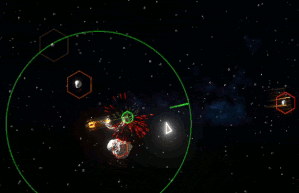
Autonomic
Simply tell the autopilot the heading you wish go with the autopilot vector, and it will navigate automatically. For direct control the player must actively left-click-drag or right-click-drag the autopilot vector. Selecting an object with autopilot will navigate the ship towards the object, as well as automatically collect small objects.
Autopilot Feature Descriptions
ARL
Antipodal Reaction Limiter cancels out opposing thrusters, conserving fuel.
AAT
Adaptive Angular Thrust considers cargo mass shifts and thruster damage when calculating required thrust, enabling the autopilot to more effectively maneuver vessels with significant cargo and/or damage.
RTC
Rotational Thrust Computation enables the autopilot to more accurately predict the impact of thruster alignment on rotation, enabling faster heading adjustments and reducing unintentional rotation. Autopilots equipped with RTC make greater use of thrusters while rotating, leading to greater propellant consumption and faster turns.
FBW
Fly By Wire routes manual thrust inputs (WASD) through the autopilot, allowing pilots to make use of autopilot capabilities while under manual control. This makes manual piloting more efficient and responsive, and enables use of gimbled drives.
Can Use Gimbaled Main Drives Efficiently
Allows for the autopilot to properly take advantage of torches with a gimbal or vectored thrust capabilities to their potential, instead of treating them as a static thrust torch. Do note that this only affects torches, RCS thrusters with gimbal will use them regardless of the autopilot.
